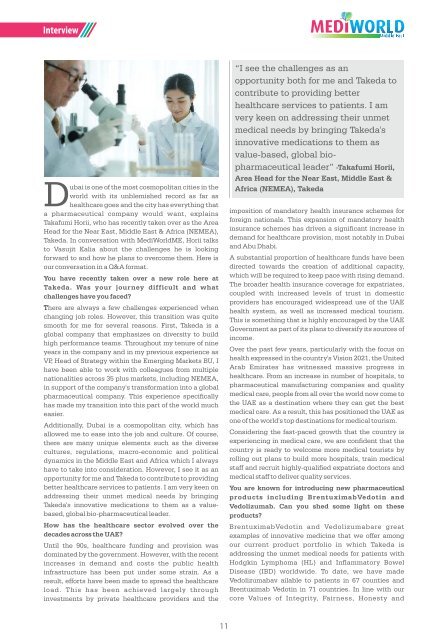Mediworld September-October 2018 LR
You also want an ePaper? Increase the reach of your titles
YUMPU automatically turns print PDFs into web optimized ePapers that Google loves.
Interview<br />
Dubai is one of the most cosmopolitan cities in the<br />
world with its unblemished record as far as<br />
healthcare goes and the city has everything that<br />
a pharmaceutical company would want, explains<br />
Takafumi Horii, who has recently taken over as the Area<br />
Head for the Near East, Middle East & Africa (NEMEA),<br />
Takeda. In conversation with MediWorldME, Horii talks<br />
to Vasujit Kalia about the challenges he is looking<br />
forward to and how he plans to overcome them. Here is<br />
our conversation in a Q&A format.<br />
You have recently taken over a new role here at<br />
Takeda. Was your journey difficult and what<br />
challenges have you faced?<br />
There are always a few challenges experienced when<br />
changing job roles. However, this transition was quite<br />
smooth for me for several reasons. First, Takeda is a<br />
global company that emphasizes on diversity to build<br />
high performance teams. Throughout my tenure of nine<br />
years in the company and in my previous experience as<br />
VP, Head of Strategy within the Emerging Markets BU, I<br />
have been able to work with colleagues from multiple<br />
nationalities across 35 plus markets, including NEMEA,<br />
in support of the company's transformation into a global<br />
pharmaceutical company. This experience specifically<br />
has made my transition into this part of the world much<br />
easier.<br />
Additionally, Dubai is a cosmopolitan city, which has<br />
allowed me to ease into the job and culture. Of course,<br />
there are many unique elements such as the diverse<br />
cultures, regulations, macro-economic and political<br />
dynamics in the Middle East and Africa which I always<br />
have to take into consideration. However, I see it as an<br />
opportunity for me and Takeda to contribute to providing<br />
better healthcare services to patients. I am very keen on<br />
addressing their unmet medical needs by bringing<br />
Takeda's innovative medications to them as a valuebased,<br />
global bio-pharmaceutical leader.<br />
How has the healthcare sector evolved over the<br />
decades across the UAE?<br />
Until the 90s, healthcare funding and provision was<br />
dominated by the government. However, with the recent<br />
increases in demand and costs the public health<br />
infrastructure has been put under some strain. As a<br />
result, efforts have been made to spread the healthcare<br />
load. This has been achieved largely through<br />
investments by private healthcare providers and the<br />
“I see the challenges as an<br />
opportunity both for me and Takeda to<br />
contribute to providing better<br />
healthcare services to patients. I am<br />
very keen on addressing their unmet<br />
medical needs by bringing Takeda's<br />
innovative medications to them as<br />
value-based, global biopharmaceutical<br />
leader” -Takafumi Horii,<br />
Area Head for the Near East, Middle East &<br />
Africa (NEMEA), Takeda<br />
imposition of mandatory health insurance schemes for<br />
foreign nationals. This expansion of mandatory health<br />
insurance schemes has driven a significant increase in<br />
demand for healthcare provision, most notably in Dubai<br />
and Abu Dhabi.<br />
A substantial proportion of healthcare funds have been<br />
directed towards the creation of additional capacity,<br />
which will be required to keep pace with rising demand.<br />
The broader health insurance coverage for expatriates,<br />
coupled with increased levels of trust in domestic<br />
providers has encouraged widespread use of the UAE<br />
health system, as well as increased medical tourism.<br />
This is something that is highly encouraged by the UAE<br />
Government as part of its plans to diversify its sources of<br />
income.<br />
Over the past few years, particularly with the focus on<br />
health expressed in the country's Vision 2021, the United<br />
Arab Emirates has witnessed massive progress in<br />
healthcare. From an increase in number of hospitals, to<br />
pharmaceutical manufacturing companies and quality<br />
medical care, people from all over the world now come to<br />
the UAE as a destination where they can get the best<br />
medical care. As a result, this has positioned the UAE as<br />
one of the world's top destinations for medical tourism.<br />
Considering the fast-paced growth that the country is<br />
experiencing in medical care, we are confident that the<br />
country is ready to welcome more medical tourists by<br />
rolling out plans to build more hospitals, train medical<br />
staff and recruit highly-qualified expatriate doctors and<br />
medical staff to deliver quality services.<br />
You are known for introducing new pharmaceutical<br />
products including BrentuximabVedotin and<br />
Vedolizumab. Can you shed some light on these<br />
products?<br />
BrentuximabVedotin and Vedolizumabare great<br />
examples of innovative medicine that we offer among<br />
our current product portfolio in which Takeda is<br />
addressing the unmet medical needs for patients with<br />
Hodgkin Lymphoma (HL) and Inflammatory Bowel<br />
Disease (IBD) worldwide. To date, we have made<br />
Vedolizumabav ailable to patients in 67 counties and<br />
Brentuximab Vedotin in 71 countries. In line with our<br />
core Values of Integrity, Fairness, Honesty and<br />
11

















